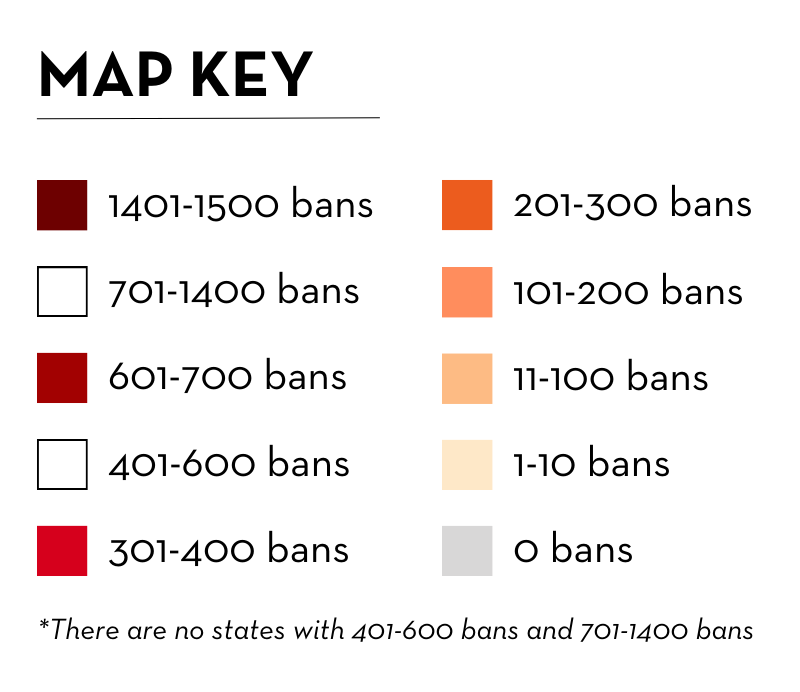Banned in the USA: The Mounting Pressure to Censor
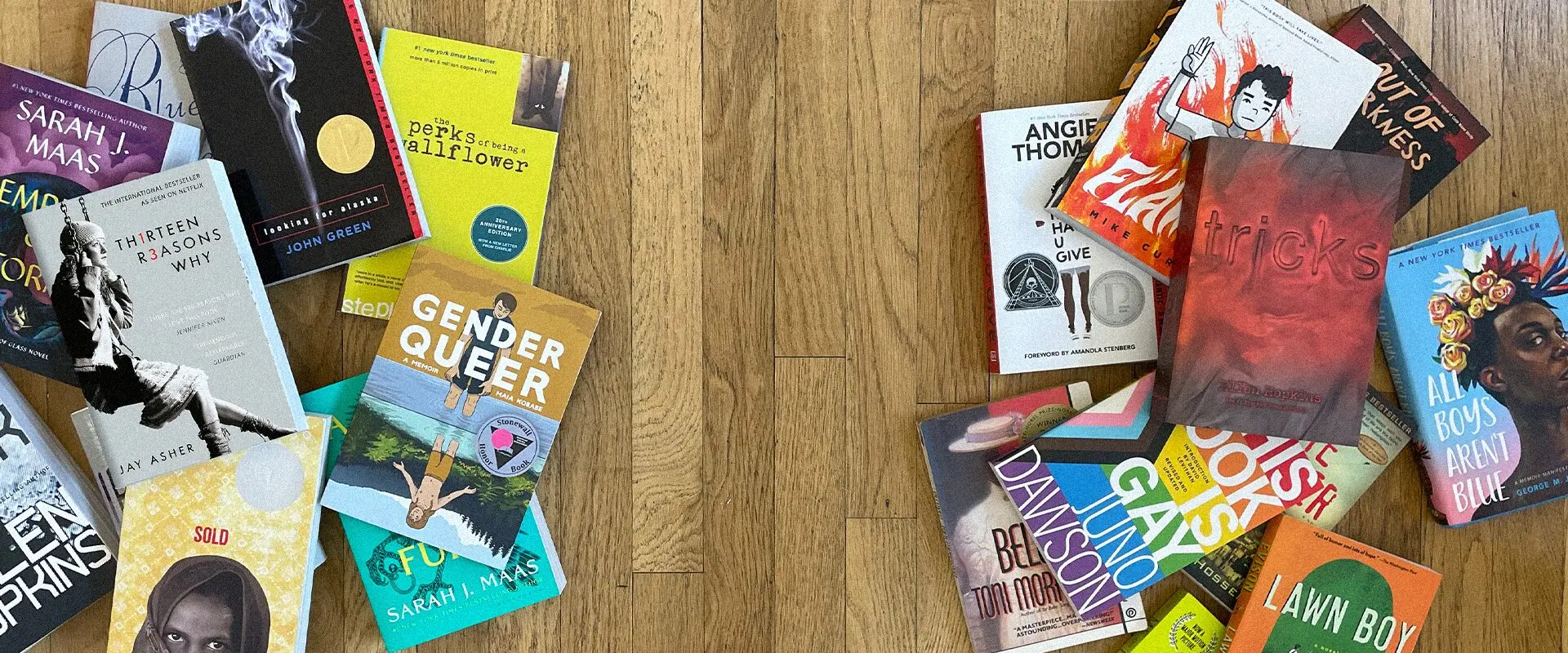
Key Findings:
Book bans in public K–12 schools continue to intensify. In the 2022–23 school year, PEN America recorded 3,362 instances of books banned, an increase of 33 percent from the 2021–22 school year.
Over 40 percent of all book bans occurred in school districts in Florida. Across 33 school districts, PEN America recorded 1,406 book ban cases in Florida, followed by 625 bans in Texas, 333 bans in Missouri, 281 bans in Utah, and 186 bans in Pennsylvania.
Hyperbolic and misleading rhetoric about “porn in schools” and “sexually explicit,” “harmful,” and “age inappropriate” materials led to the removal of thousands of books covering a range of topics and themes for young audiences. Overwhelmingly, book bans target books on race or racism or featuring characters of color, as well as books with LGBTQ+ characters. And this year, banned books also include books on physical abuse, health and well-being, and themes of grief and death. Notably, most instances of book bans affect young adult books, middle grade books, chapter books, or picture books—books specifically written and selected for younger audiences.
Punitive state laws, coupled with pressure from vocal citizens and local and national groups, have created difficult dilemmas for school districts, forcing them to either restrict access to books or risk penalties for educators and librarians. Eighty-seven percent of all book bans were recorded in school districts with a nearby chapter or local affiliate of a national advocacy group known to advocate for book censorship. Sixty-three percent of all book bans occurred in eight states with legislation that has either directly facilitated book bans or created the conditions for local groups to pressure and intimidate educators and librarians into removing books.
PEN America Experts:
Program Director, Freedom to Read
Sy Syms Managing Director, U.S. Free Expression Programs
Senior Program Manager, Freedom to Read
Senior Advisor, Freedom to Read
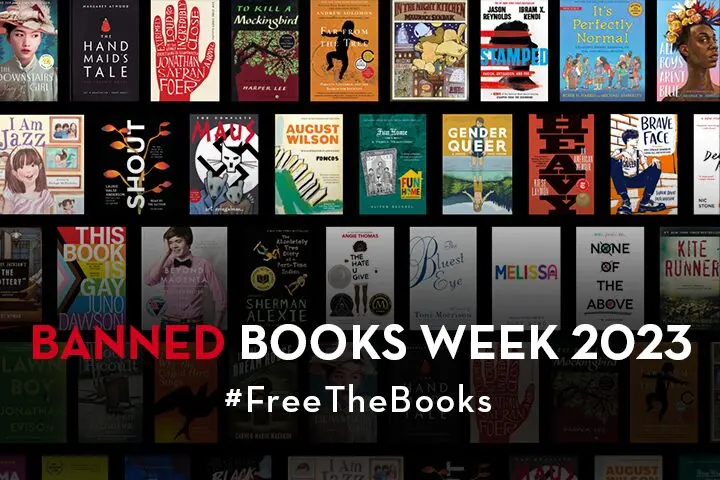
Introduction
The freedom to read is under assault in the United States—particularly in public schools—curtailing students’ freedom to explore words, ideas, and books. In the 2022–23 school year, from July 1, 2022, to June 31, 2023, PEN America recorded 3,362 instances of book bans in US public school classrooms and libraries. These bans removed student access to 1,557 unique book titles, the works of over 1,480 authors, illustrators, and translators. Authors whose books are targeted are most frequently female, people of color, and/or LGBTQ+ individuals. Amid a growing climate of censorship, school book bans continue to spread through coordinated campaigns by a vocal minority of groups and individual actors and, increasingly, as a result of pressure from state legislation.
3,362
The instances of book bans that PEN America recorded in the 2022-2023 school year
Book Bans in Public Schools
Over the past two and a half years, PEN America has been at the forefront of tracking an evolving movement to exert ideological control over public education across the United States. This campaign—which PEN America has dubbed the “Ed Scare”—is penetrating public libraries, higher education institutions, and public schools, using state legislation and intimidation tactics to suppress teaching and learning about certain stories, identities, and histories.
Over the past two years, coordinated and ideologically driven threats, challenges, and legislation directed at public school classrooms and libraries have spurred a wave of book bans unlike any in recent memory, diminishing students’ access to books and directly impacting their constitutional rights.
Efforts to suppress free expression are particularly pervasive in public schools, where coordinated campaigns to restrict the freedom to read, learn, and think are affecting students nationwide. PEN America has tracked the spread of explicit prohibitions to restrict teaching about topics such as race, gender, American history, and LGBTQ+ identities in K–12 and higher education—which we have dubbed “educational gag orders”—as well as legislative mandates that require intrusive forms of inspection or monitoring of teachers and librarians, which we have dubbed “educational intimidation bills.” These legislative efforts work in tandem with coordinated campaigns locally, enabling local groups and individuals to challenge curricula, movies, songs, art, plays, and thousands and thousands of books.
Public schools have long been deemed essential to American democracy. Identified by John Adams as “necessary for the preservation of rights and liberties,” public schools facilitate information sharing, knowledge building, and the ongoing unification that undergirds a pluralistic society. Public schools do this, in part, through robust library programs. School libraries play a critical role in making information and knowledge accessible to students while also fostering lifelong learning, student achievement, and literacy. Over the past two years, coordinated and ideologically driven threats, challenges, and legislation directed at public school classrooms and libraries have spurred a wave of book bans unlike any in recent memory, diminishing students’ access to books and directly impacting their constitutional rights.
What is a School Book Ban?
PEN America defines a school book ban as any action taken against a book based on its content and as a result of parent or community challenges, administrative decisions, or in response to direct or threatened action by lawmakers or other governmental officials, that leads to a previously accessible book being either completely removed from availability to students, or where access to a book is restricted or diminished.
It is important to recognize that books available in schools, whether in a school or classroom library or as part of a curriculum, were selected by librarians and educators as part of the educational offerings to students. Book bans occur when those choices are overridden by school boards, administrators, teachers, or even politicians on the basis of a particular book’s content.
For more details, please visit PEN America’s Methodology and Frequently Asked Questions on book bans. You can also visit our prior reports on book bans released in April 2022, September 2022, and April 2023.
During the 2022–23 school year, PEN America tracked 3,362 instances of book bans, an increase of 33 percent from the 2021–22 school year. These book bans affected at least 1,557 unique titles. Since 2021, over 2,823 unique book titles have been banned in public schools across the country. To understand the depth and breath of the ongoing crisis, it’s important to look at both the instances of book bans and individual titles banned.
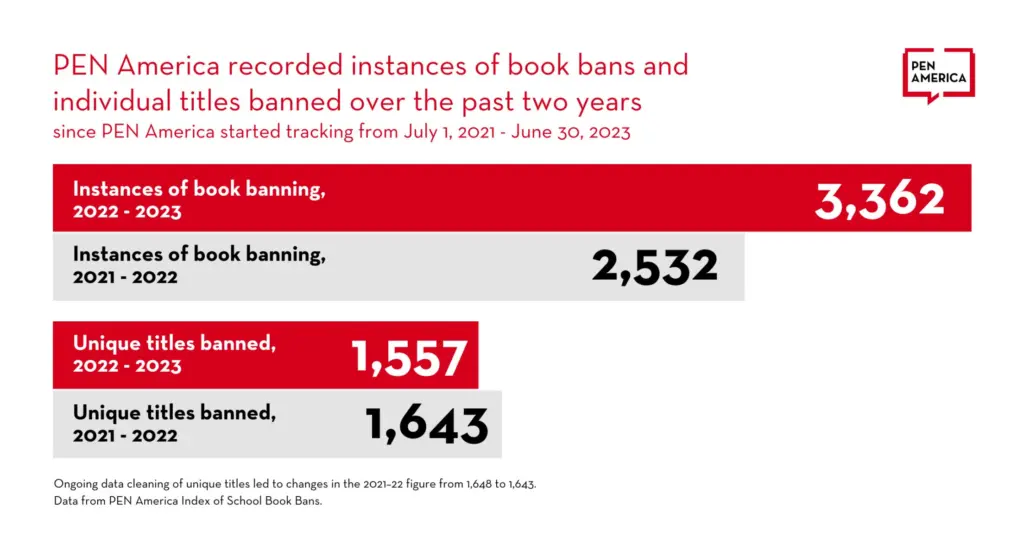
Most book bans in this year’s Index are classified as “banned pending investigation.” These are instances where a title was removed during a review to determine what restrictions, if any, to implement on it. Books banned in this manner can linger off shelves for long periods of time before they have been evaluated. Such a case has been ongoing in Beaufort, South Carolina, for the past year. In October 2022, 97 books challenged in Beaufort County School District were immediately pulled from access, pending review. As of August 2023, 66 books have been reviewed while 31 books still await their fate. For nearly an entire school year, students have been banned from accessing books including Skin by Donna Jo Napoli, A Court of Frost and Starlight by Sarah J. Maas, Felix Ever After by Kacen Callender, and The Fixer by Bernard Malamud.
The 2022–23 school year saw a stark increase in books “banned from classrooms and libraries” compared to last school year. These are cases where books were decidedly removed from classroom and school libraries. Out of the total book bans in this year’s Index, 1,263 cases were banned from classrooms and libraries, compared to only 333 cases banned from classrooms and libraries last year—an increase of nearly 400 percent. The increase is likely due to a range of factors, including districts revising their policies to prohibit certain types of content, district decisions overriding standard processes, and districts responding to legislation.
| Ban Status | Total Instances | Percent |
| Banned pending investigation | 1,466 | 44% |
| Banned from libraries and classrooms | 1,263 | 38% |
| Banned from libraries | 604 | 18% |
| Banned from classrooms | 29 | >1% |
Most Banned Titles and Content
Of the over 3,000 instances of books banned in the 2022–23 school year, 11 books were banned in 22 districts or more.
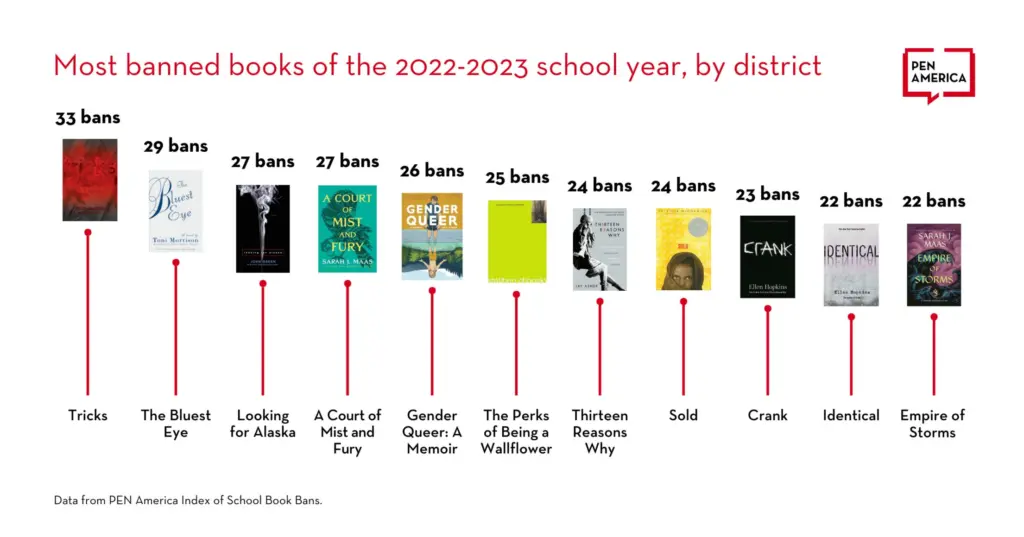
These most frequently banned titles are largely young adult novels featuring female, queer, and/or nonbinary protagonists.
This 2022–23 school year, efforts to remove books expanded to sweep up a wide swath of literature and health-related content. Of the 3,362 instances of books banned in the 2022–23 school year, certain themes, formats, and identities recur:
- 48 percent include themes or instances of violence and abuse (n =1,620). Of note, within this category, 834 instances are books that include episodes of sexual assault, which is 25 percent of all instances of books banned.
- 42 percent cover topics on health and wellbeing for students (n = 1,402). This includes content on mental health, bullying, suicide, substance abuse, as well as books that discuss sexual wellbeing and puberty.
- 33 percent detail sexual experiences between characters (n = 1,110).
- 30 percent include characters of color or discuss race and racism (n = 1,003)
- 30 percent LGBTQ+ characters or themes (n = 997). Of note, within this category, 205 instances are books that include transgender characters, which is 6 percent of all instances of books banned.
- 29 percent include instances or themes of grief and death (n = 980). This includes books that have a character death or a related death that is impactful to the plot or a character’s emotional arc.
Note: Numerous books tracked in the Index fit into multiple categories simultaneously. Further, categories appearing in less than 15 percent of instances in the Index are not reported here; these categories are developed based on researchers’ assessment of books, publisher summaries, Amazon Books, Goodreads, and expert opinions of librarians.
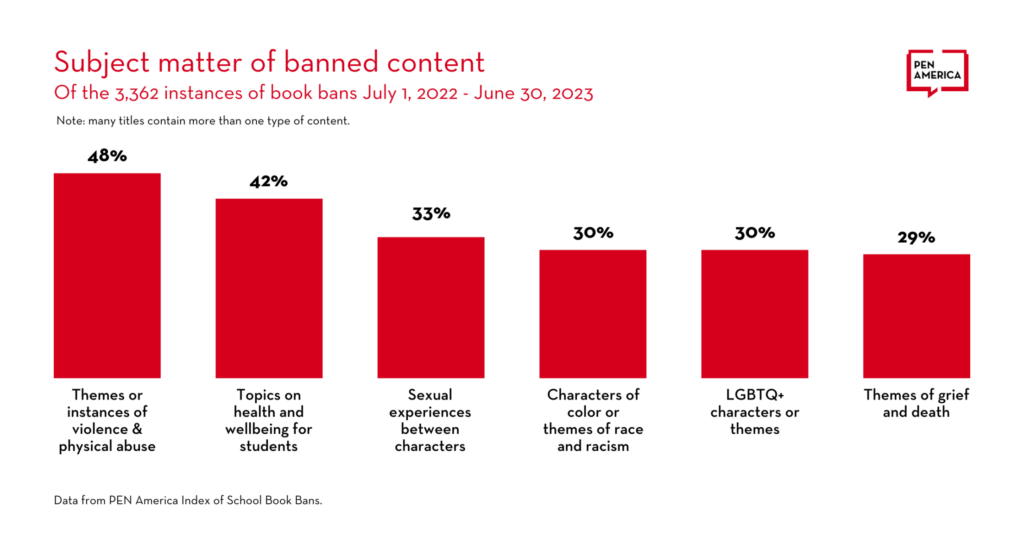
As with previous reporting, books concerning difficult topics that young people might face have continued to be among the most targeted for suppression during the 2022–23 school year. This year’s book bans also disproportionately affect books about the experiences of marginalized identities. Specifically, 30 percent of all instances are books that include characters of color and themes of race and racism, 30 percent represent LGBTQ+ identities, and 6 percent include a transgender character. Book bans also targeted stories centering immigrants (at least 68 instances), Jewish characters (at least 41 instances), and Muslim characters (at least 57 instances).
While recent efforts to diversify books for children and teens has led to greater visibility in libraries and classrooms, ongoing efforts to ban books with historically marginalized identities push against progress as countless books that include characters with diverse racial, sexual, and gender identities are pulled from school and library shelves.
When we examine the scope of the last two years, books that include diverse characters, primarily characters of color and LGBTQ+ characters, were overwhelmingly subject to book bans. While recent efforts to diversify books for children and teens has led to greater visibility in libraries and classrooms, ongoing efforts to ban books with historically marginalized identities push against progress as countless books that include characters with diverse racial, sexual, and gender identities are pulled from school and library shelves. In addition, over a third of all books removed since 2021 include instances of violence and physical abuse, which include books depicting sexual assault.
Of the 5,894 instances of books banned across the 2021–22 and 2022–23 school years:
- 37 percent include themes or instances of violence and physical abuse (n = 2180). Of note, within this category, 1,134 instances are books that include episodes of sexual assault, which is 19 percent of all instances of books banned.
- 37 percent include characters of color or discuss race and racism (n = 2,152).
- 36 percent present LGBTQ+ characters or themes (n = 2,122). Of note, within this category, 442 instances are books that include transgender characters, which is 8 percent of all instances of books banned.
- 34 percent cover topics on health and well-being for students (n = 2,029).
- 27 percent detail sexual experiences between characters (n = 1,560).
- 22 percent are books that include instances or themes of grief and death (n = 1,315). This includes books that have a character death or a related death that is impactful to the plot or a character’s emotional arc.
Note: Numerous books tracked in the Index fit into multiple categories simultaneously. Further, categories appearing in less than 15 percent of instances in the Index are not reported here; these categories are developed based on researchers’ assessment of books, publisher summaries, Amazon Books, Goodreads, and expert opinions of librarians.
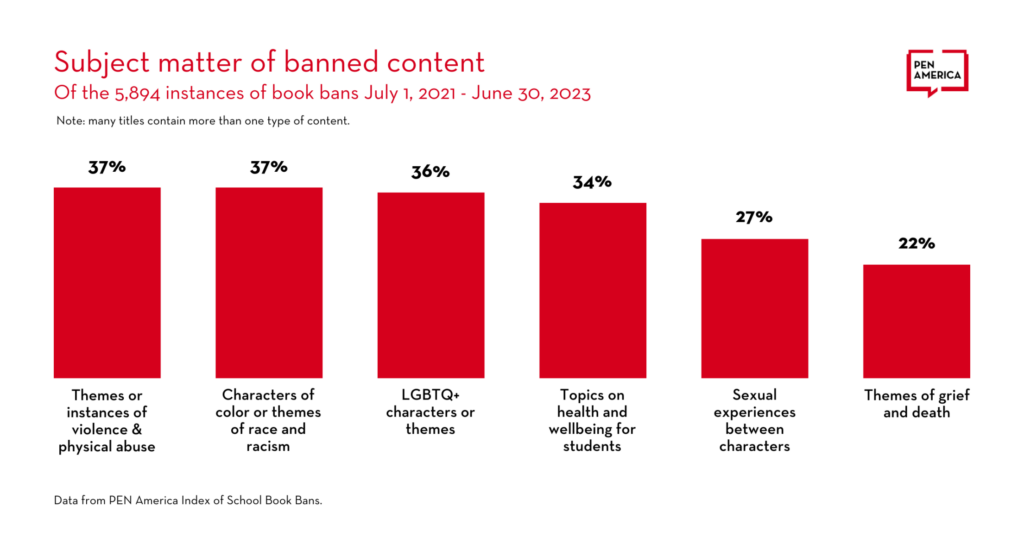
Where Are Book Bans Happening?
During the 2022–23 school year, book bans occurred in 153 districts in 33 states. Over 40 percent of all book bans occurred in school districts in Florida—and with over 1,400 recorded book ban cases, Florida had the highest number of book bans and largest number of school districts (33) removing books compared to any other state. Florida is followed by Texas, which had 625 book bans across 12 districts; Missouri, which had 333 book bans across 14 districts; Utah, which had 281 book bans across 10 districts; and Pennsylvania, which had 186 book bans across 7 districts.
Total Instances of Book Bans by State, July 2022 – June 2023
Book bans are not happening solely in traditionally conservative states or counties. Examining states with book bans against recent voting patterns, 19 of these 33 states (58 percent) voted Republican during the 2020 presidential election, while 14 states (42 percent) voted Democratic. However, Republican-leaning states had more districts banning books than Democratic-leaning states; 50 districts out of 153 (33 percent) are in states that voted Democratic in the 2020 presidential election, while 103 districts are in states that voted Republican. These 103 districts account for 88 percent of all book ban cases in the 2022–23 school year.
| Political Leaning | Number of states with instances of book bans | Number of districts in states with instances of book bans | Total instances of book bans | Percent of book bans |
| Republican | 19 | 103 | 2,943 | 88% |
| Democrat | 14 | 50 | 419 | 12% |
Authors and Illustrators Impacted

Book bans in the 2022–23 school year affected the works of more than 1,480 creative people—1,207 authors, 268 illustrators, and 14 translators. Some authors had many of their books banned, while others had a single book banned in numerous districts.
For example, this year, 52 districts removed 19 unique titles by verse novelist Ellen Hopkins. In total, her works were banned 225 times. Hopkins writes for young adult audiences; her work addresses topics including drug use and human trafficking. Other authors, like Maia Kobabe, have one specific title that is repeatedly targeted; in this case, Gender Queer was banned 26 times across 26 districts. Gender Queer is a memoir based on the author’s own experience as a young person exploring eir gender identity and sexuality.
| Author | Number of districts that banned author’s work | Total instances of book bans | Total number of unique titles |
| Ellen Hopkins | 52 | 225 | 19 |
| Sarah J. Maas | 36 | 158 | 16 |
| Margaret Atwood | 34 | 52 | 5 |
| Toni Morrison | 30 | 47 | 5 |
| Elana K. Arnold | 29 | 51 | 5 |
| Jesse Andrews | 29 | 34 | 2 |
| John Green | 28 | 30 | 4 |
| Rupi Kaur | 27 | 41 | 3 |
| Maia Kobabe | 26 | 26 | 1 |
| Stephen Chbosky | 25 | 25 | 1 |
Prohibitions Targeting Young Adult Books and the Misrepresentation of “Sexual Content” and “Inappropriate” Materials
In the 2022–23 school year, the movement to ban books increasingly focused on content perceived as “sexual” or “inappropriate.” However, over 75 percent of all books banned are young adult books, middle grade books, chapter books, or picture books—books specifically written and selected for younger audiences. Less than a quarter of all banned books are classified as an adult book.

Librarians and educators understand the importance of literature written for young people and the role it plays in their intellectual and emotional development. The intent of YA literature is to create stories that mirror the real-life experiences of young people in navigating an increasingly complex world as they move from children to adults.
Calls for books to be removed have frequently and inaccurately labeled books as “harmful” or “obscene,” and conflated any LGBTQ+ content with “pornography,” in a reliance on long-standing, discriminatory tropes.
Scholars Nic Hilton and Gabriel Duckels in an editorial for the International Journal of Young Adult Literature contextualize YA as follows:
“YA has always been a ground for ideological struggles and social constructions of what sex ‘should look like’ for young adults. Emphasis on certain types of representations of sex and sexuality—such as losing your virginity, teen pregnancy, and sexual identity—ensures YA’s place as a space of exploration, and for figuring out our relationships to difficult topics.”
In discussing violence in YA literature in the Journal of Adolescent and Adult Literacy, educators Judith Franzak and Elizabeth Noll state states that it is “important for readers of all ages to recognize the presence of violence in literature in order to gain a better understanding of it in their own world. . . . If we can understand how we interpret violence, we are perhaps better equipped to resist violence in our midst.”
Calls for books to be removed have frequently and inaccurately labeled books as “harmful” or “obscene,” and conflated any LGBTQ+ content with “pornography,” in a reliance on long-standing, discriminatory tropes. PEN America explored this dynamic in our report on book bans in the Walton County School District in Florida in April 2022.
PEN America’s analysis of categories and grade levels continues to illuminate how efforts to remove books are sweeping up a wide range of stories across grade levels, themes, and content areas that are specifically written and selected by educators to help young people learn about and engage with the world. As such, these efforts hamper not only students’ freedom to read but their access to the very stories designed to support their growth and development.
1,482
Total number of authors, illustrators, and translators impacted by book bans in the 2022-2023 school year
The Mounting Pressure to Censor: The Drivers Behind Book Bans
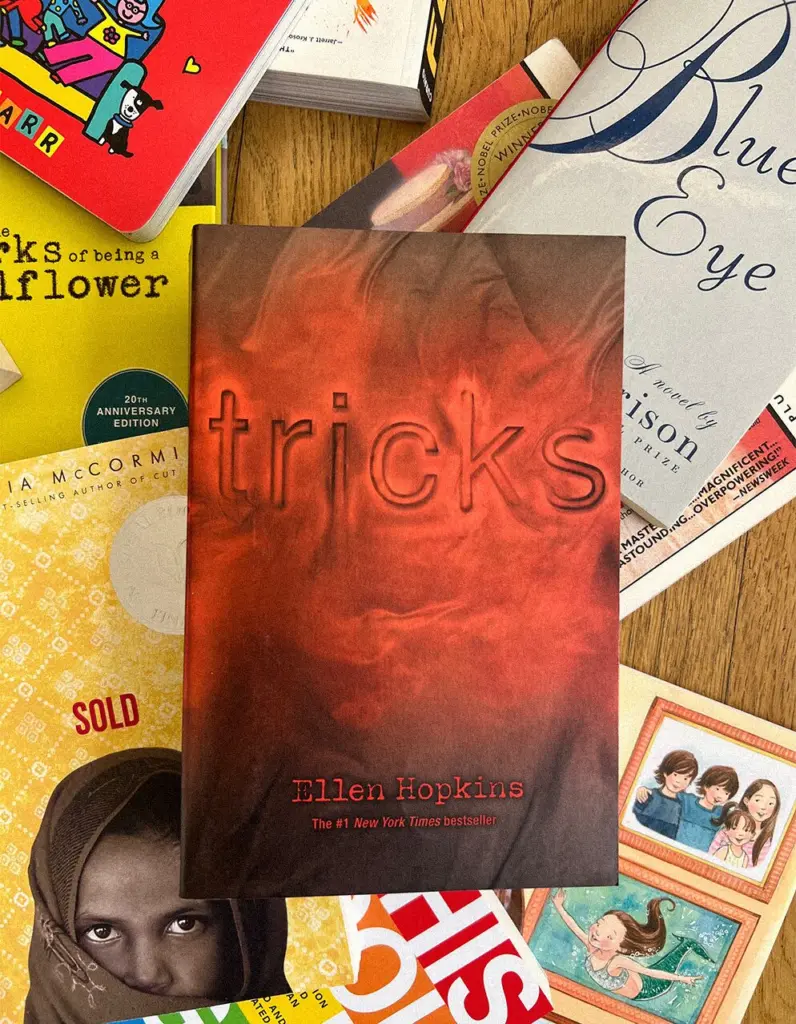
In a May 2023 Ipsos/NPR poll, 65 percent of Americans stated that they oppose book bans by school boards, and 69 percent oppose book bans by state lawmakers. And yet book bans continue to proliferate. PEN America’s ongoing research and analysis point to two influential drivers behind this: advocacy groups and, increasingly, state legislation. This school year, we have also seen what happens when these two influences converge. The result is that more and more districts, board members, school administrators, educators, and librarians are facing both community pressure and state legislation restricting what books they can make available to students. This has left many educators and administrators feeling forced to remove books because of intimidation or fear of penalty.
The Role of Groups
In a September 2022 report, PEN America detailed the influence of parent- and community-led advocacy groups in shaping the tone, tenor, and frequency of book bans. At the time, we identified at least 50 groups involved in pushing for book bans at the national, state, and local levels. This included eight groups with national, state, or local chapters. Members of these advocacy groups push for book bans by directly advocating for book removals through challenge forms and at school board meetings, sometimes using provocative rhetoric about “porn in schools” and “indoctrination.” These advocacy groups have stoked public anxiety regarding the types of books students can access in classrooms and school libraries.
Three national advocacy groups have been particularly prominent in pushing for book bans: Moms for Liberty, Citizens Defending Freedom, and Parents’ Rights in Education. Having formed in Florida in 2021, Moms for Liberty now boasts 284 chapters or local affiliates over 44 states; Citizens Defending Freedom claims 20 local affiliates, located primarily in Texas and Georgia; and Oregon-based Parents’ Rights in Education has local affiliations in 15 states.
As of the 2022–23 school year, one or more of these three groups operate in 32 of the 33 states represented in this school year’s Index of School Book Bans, the only exception being Utah, where another advocacy group, Utah Parents United, plays a similar role in publicly calling on districts to remove certain books from schools.
More granularly, among the 153 districts across the United States that banned a book during the school year, 124, or 81 percent, either are in or adjoin a county that has a chapter or local affiliate of one or more of these three national groups. These districts are where 2,912 book ban cases, or 87 percent of all book bans recorded, have occurred this school year.
| Number of districts with instances of book bans | Number of districts with a chapter/affiliate nearby | Percent of districts with chapter/affiliate nearby |
| 153 | 124 | 81% |
While these advocacy groups espouse staunchly conservative values, they are not only operating in Republican-leaning districts. Examining voting patterns at the district level, 98 districts where book bans were recorded voted Republican in the 2020 presidential election, while 49 voted Democratic. Across voting preferences, the prevalence of chapters and affiliates is high—at least 80 percent of both Democratic- and Republican-leaning districts where book bans occurred either lie in or adjoin a county that has a chapter or local affiliate of one or more of these three national groups.
| Political leaning of school’s district’s county | Number of districts with instances of book bans | Number of districts with a chapter/affiliate nearby | Percent of districts with a chapter/affiliate nearby |
| Republican | 98 | 78 | 80% |
| Democrat | 49 | 39 | 82% |
| Split | 6 | 6 | 100% |
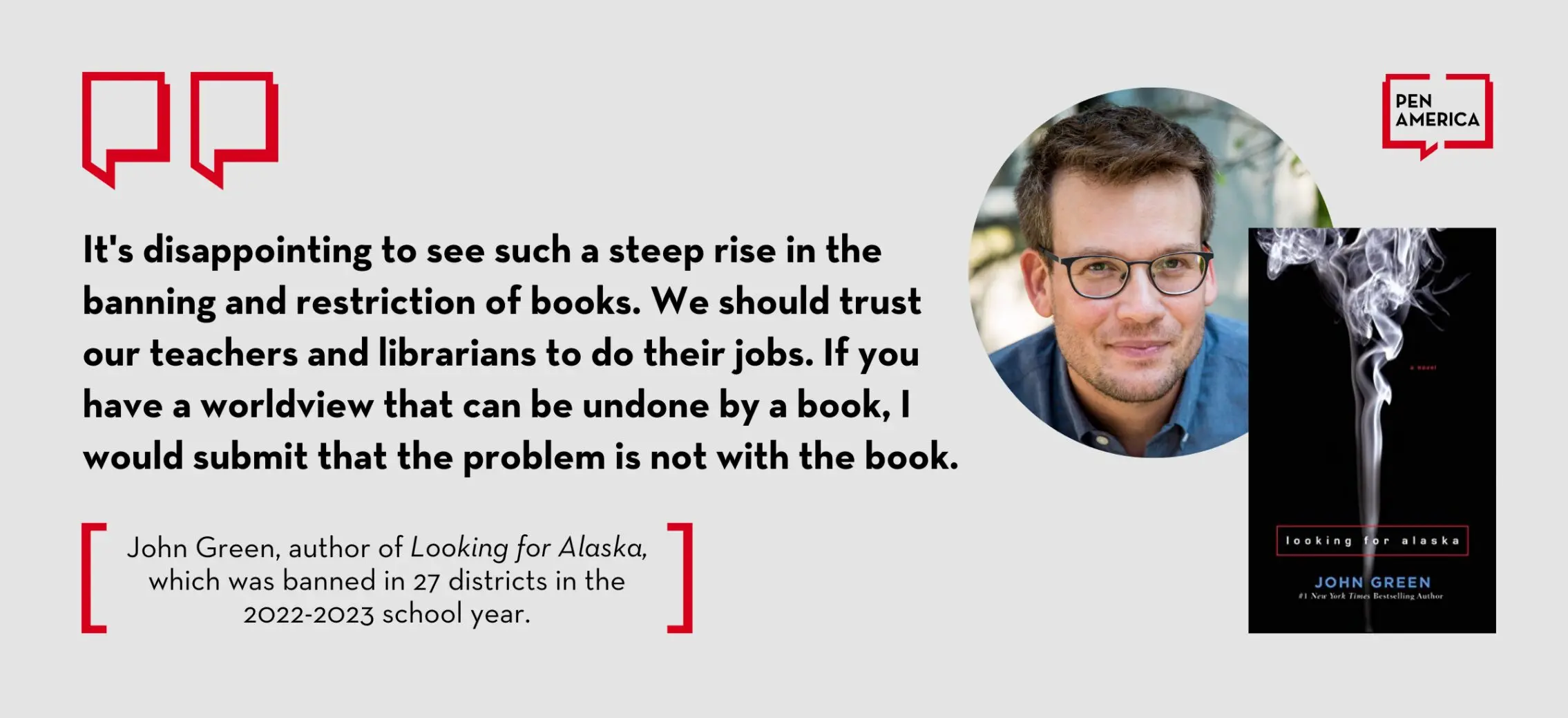
These prominent groups, in addition to other state and local organizations, form a network of individuals who share strategies and tactics across online platforms. For example, Book Looks, created by a Moms for Liberty member from Florida, is an online repository of book content designed for finding “objectionable” material. In February 2023, Penncrest School District in Pennsylvania banned over 100 books pending review. School board members and others advocating for the removal used Book Looks as a guide to their list making. In August 2023, the chair of the Hanover County School Board in Virginia announced that Book Looks would be used as part of the district’s evaluation tools for challenged books.
Other groups operate primarily in one state but have also had influence nationally, like Utah Parents United, which has provided step-by-step instructions on how to identify “sexually explicit books in your child’s school library.” Utah Parents United’s associated Facebook group, LaVerna in the Library, also makes it easy for individuals from across the United States to identify and share information on “sexually explicit books,” as well as tactics for challenging books. Moms for Liberty chapters, like in Bucks County, Pennsylvania, will also identify books to encourage their removal on social media platforms.
Many of these groups also recruit and train individuals to challenge books for removal in their own school districts. In May 2023, the person who challenged over 100 books in Escambia County, Florida, visited nearby Santa Rosa County to share her “tips on how to get content removed” with the local Moms for Liberty chapter. Since then, several Moms for Liberty members have challenged books in Santa Rosa. Testimonials from members of Parents’ Rights in Education thank the organization for providing training that supports efforts to “fight back against radical school policies and curriculum.” The Parents’ Rights in Education platform also includes a password-protected “Parent Activist Training Center.”
These groups also aim to influence district policy and state legislation. In 2021, the founder of Moms for Liberty stood next to Governor Ron DeSantis at the signing of the “Parental Rights in Education” bill (HB 1557), designated “Don’t Say Gay.” The organization also successfully advocated for the expansion of these restrictions on teaching grades K–8 during Florida’s 2023 legislative session. Citizens Defending Freedom endorsed the expanded Florida legislation as well. In Wisconsin, the Moms for Liberty chapter states one of their primary goals as “shaping public policy,” while in Iowa, a founder of Moms for Liberty organized a town hall for Governor Kim Reynolds in February. Governor Reynolds thanked the group for supporting Iowa’s “Don’t Say Gay” copycat legislation.
The prevalence and demonstrated influence of advocacy groups has put incredible pressure on school boards and districts. The groups have an outsize influence, driving bans forward despite the fact that most Americans oppose book bans and believe public schools should consider multiple sources when making decisions about school library books.
Locally, groups like the Pennsylvania Family Institute, a state chapter of the Family Research Council, influenced the adoption of Central Bucks School District’s revised book-challenge policy that prohibits “sexualized content” and omits previous policy language that granted exceptions for literary merit. Gender Queer by Maia Kobabe and This Book Is Gay by Juno Dawson were subsequently removed using the new policy’s process.
Advocacy groups also aim to influence district decision-making as members of school boards. Well-funded political action committees help get like-minded candidates elected to school boards, including their own chapter members.
According to a We Believe x Ipsos poll administered in August 2023, only 7 percent of parents believe books should be removed at the objection of a single parent. However, these groups often empower “serial book challengers” in their efforts to remove books from classrooms and school libraries. In May 2023, an analysis of book challenges by the Washington Post connected 66 percent of over 1,000 challenges to just 11 individuals; in August 2023, the Tampa Bay Times also documented the influence of two individuals in challenging hundreds of books in Florida. Many of these individuals were directly connected to advocacy groups including Mama Bears of Catawba County in North Carolina, Moms for Liberty–Indian River in Florida, No Left Turn in Education in Florida, and Mama Bears of Forsyth County in Georgia.
As PEN America has previously noted, most of these are tactics that many advocacy groups employ to a wide range of ends. Citizens are free to organize and advocate; these liberties are protected under the First Amendment’s safeguards for freedom of association. PEN America’s concern is not with the use of such organizing and mobilization tactics but rather with the end goal of restricting or banning books and the impact it is having on students’ education.
The prevalence and demonstrated influence of advocacy groups has put incredible pressure on school boards and districts. The groups have an outsize influence, driving bans forward despite the fact that most Americans oppose book bans and believe public schools should consider multiple sources when making decisions about school library books.
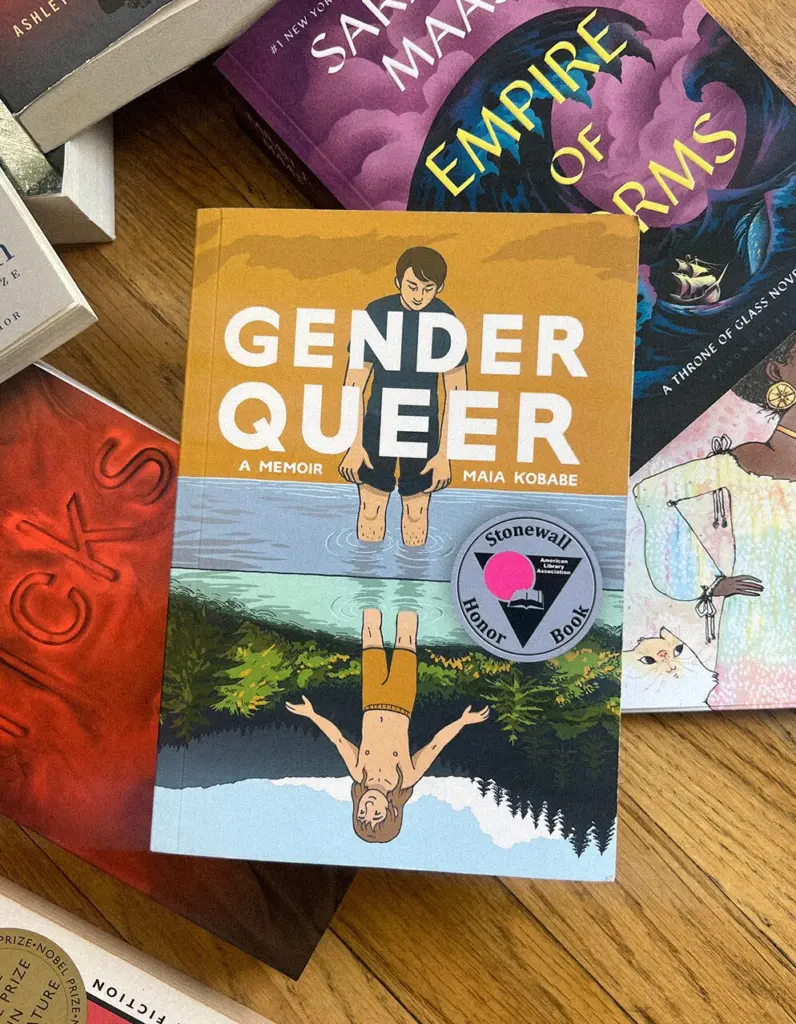
State Legislation
PEN America previously explained how school book banning efforts were “supercharged” by state legislation in the first half of the 2022–23 school year. Our April 2023 report documented a trio of laws enacted in Florida that bar instruction on sexual orientation or gender identity, prohibit educators from discussing advantages or disadvantages based on race, and mandate that schools must catalog classroom and library books. We also tracked the effects of legislation that criminalizes the provision of “explicit sexual material” to students and “prohibits certain sensitive instructional materials in public schools” in Missouri and Utah, respectively. In an environment of vague legislation and increasing fears of punishment for educators, hundreds of books were banned during the past school year in Florida, Missouri, and Utah as a direct result of these laws.
Similar laws have passed in other states, including Virginia (SB 656), Tennessee (HB 2154/SB 2407 and HB 2666/SB 2247), Georgia (SB 226), Oklahoma (HB 3702), and West Virginia (SB 704). Legislation in these states is likely to directly influence book bans as well as indirectly chill teaching and learning in public schools. As PEN America documented in an August 2023 report, enacted “educational intimidation bills” can have a considerable chilling effect on educators and school districts—especially those already under pressure from local advocacy groups.
Indeed, among the 33 states with recorded bans this school year, eight enacted legislation that took effect in the past 12 months. Sixty-three percent of all book bans documented in this report occurred in those eight states.
| State | Number of states with instances of book bans | Total number of book titles banned in states | Percent of total books banned |
| With relevant legislation | 8 | 2,114 | 63% |
| Without relevant legislation | 25 | 1,248 | 37% |
Convergence of State Legislation and Group Activity
In examining the five states with the highest number of book bans this 2022–23 school year, all have the presence of national advocacy groups, and all but one have passed legislation likely to affect book access. These pressures work in tandem: school leaders, educators, librarians, and school boards report how fear has driven their efforts to comply with vaguely worded legislation, and this is in part because these bills also strengthen the tools that local advocacy groups can use to challenge books and pressure compliance with their censorious demands. The unfortunate result from this mounting, multifaceted pressure is that the very stories and voices that have been traditionally underrepresented on school shelves are continuing to be removed at ever-increasing rates.
| State | Total number of bans | Total number of districts with instances of book bans | State legislation | Presence of national advocacy groups |
| Florida | 1,406 | 33 | Yes | Yes |
| Texas | 625 | 12 | Passed | Yes |
| Missouri | 333 | 14 | Yes | Yes |
| Utah | 281 | 10 | Yes | Yes |
| Pennsylvania | 186 | 7 | Yes | Yes |
Classrooms and libraries are meant to be places of discussion and inquiry, with cultivated collections that help students learn to grapple with diverse, and even controversial, ideas. At its core, today’s movement to ban books does not just endanger individual libraries and classrooms; it is putting the very notion of a public education system that prioritizes information sharing, knowledge building, and acceptance and inclusion of all students at risk.
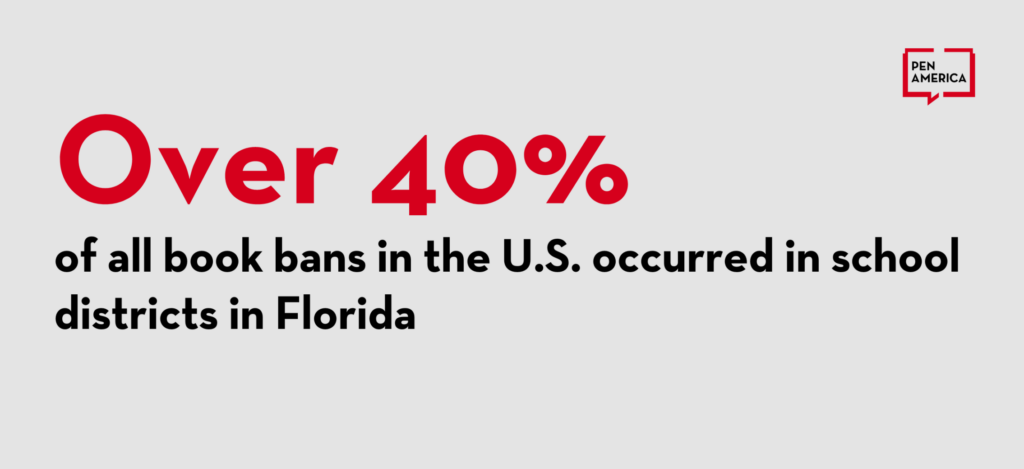
Impact on School Districts
Pressure from punitive laws, coupled with efforts from vocal citizens and local and national groups, has placed school districts in impossible situations, as they are forced to restrict access to certain books in schools or face possible penalties on educators and librarians. These dynamics are playing out across both red and blue states and districts, resulting in the further erosion of the critical relationships between educator and administrator, parent and teacher, and district and community.
In the context of teacher shortages, increased politicalization of school boards, and ongoing recovery from COVID-19 and pandemic-related learning losses, public schools are in a particularly vulnerable position. Faced with added burdens on school educators and librarians and the fear of legal liability, superintendents and administrators continue to err on the side of caution.
There’s something bad that exists here. There’s something toxic that exists here. . . . If you care about kids, as you said, we need to do things right. But to constantly undermine and constantly seek to get me out. How much poison has dripped on that podium over the past six months? It’s been extensive. It’s been ridiculous, actually.
A Florida superintendent speaks against school board members for banning books
When district leaders try to stand firm, their decisions are often overruled by school board members. Starting in the fall of 2022, a single community member lodged over 100 challenges to books in Escambia County Public Schools in Florida. The then superintendent stood behind a rigorous reconsideration process that ensured each book was reviewed by a committee and evaluated for its literary contributions. Those committees then made a proposal to the school board—typically to retain the book. However, the school board frequently overrode the committee’s recommendations. After months of tensions, the school board voted to remove the superintendent in a surprise motion led by two board members. During the school board meeting where the superintendent learned of his termination, he shared the following warning:
“There’s something bad that exists here. There’s something toxic that exists here. . . . If you care about kids, as you said, we need to do things right. But to constantly undermine and constantly seek to get me out. How much poison has dripped on that podium over the past six months? It’s been extensive. It’s been ridiculous, actually.”
In Iowa, faced with a new state law (SF 496) requiring “age appropriate” materials and prohibitions on the instruction of sexuality, gender identity, and sexual content, one district employed ChatGPT in August 2023 to determine what books should be removed, in an attempt to be “objective.” The assistant superintendent explained how the legislation forced her to use generative AI to identify books for removal in Mason City Schools, leading to the decision to ban 19 books, arguing that ChatGPT’s analysis was more nuanced than the law allows for:
“This law is written in a way where teachers and our teacher librarians have individual criminal liability. We’re in a place where we have to use an efficient and defensible practice. . . . ChatGPT almost always came back with what I would characterize as a ‘yes but’ answer. Yes, but it serves as a literary purpose, or yes, but it’s used in this context, and unfortunately, the law doesn’t give us a yes, but.”
In Texas, some district leaders are taking dramatically cautious actions in response to HB 900. In August 2023, Fort Worth Independent School District closed all classroom libraries ahead of the school year to label books in compliance with HB 900, while Katy Independent School District decided to suspend any new purchases of library books in June 2023. Other districts, like Klein Independent School District, are alleged to have “quietly” removed books this summer that had been banned elsewhere. These decisions were taken in advance of the law going into effect; yet, after a legal challenge, a federal judge has barred Texas from enforcing the legislation.
In Georgia, against the recommendation of a review committee, the Cobb County School Board voted to dismiss an educator after she read My Shadow Is Purple to her fifth-grade class, a book about being true to one’s self and thinking beyond gender binaries. The educator was initially placed on leave after violating a new district policy that barred teaching on controversial issues in accordance with HB 1084, an educational gag order passed in Georgia in April 2022 prohibiting the teaching of “divisive concepts.”
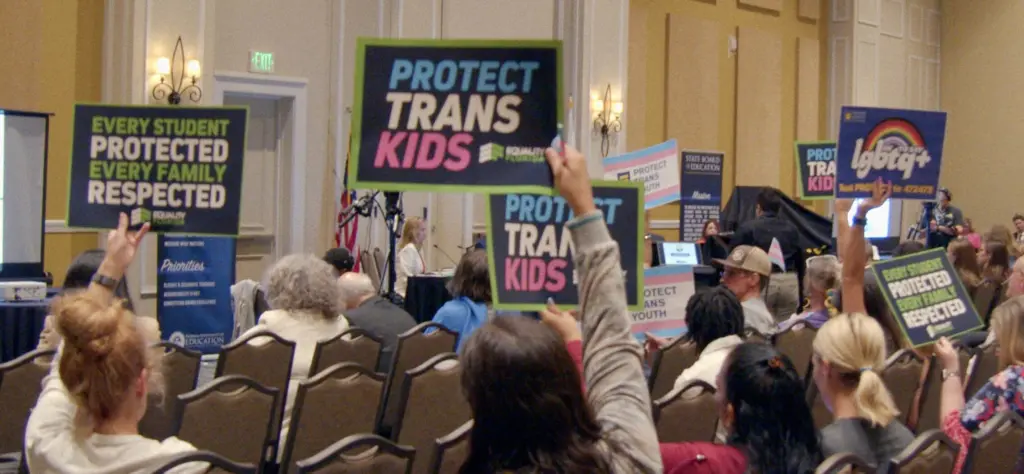
A Glimmer of Hope: Students Push Back Against Bans
As school districts feel increasingly pressured to censor, some students are responding. In May 2023, middle school students walked out of Hempfield School District in Pennsylvania to protest changing district library policies. One student stated the policy would mean “the children of the future will know very little about what the real world is like.” The same month, students in Plattsmouth, Nebraska, protested the removal of books from their library “for review,” against the district’s own policy, saying:
“Most of the books that they’re taking have LGBTQ themes or talk about racial injustice. They made a list of rules, they released their list of rules that they say they’re following but they’re not following it.”
This spring, student organizers in the Panther Anti-Racist Union in the Central York School District in Pennsylvania continued their effort to push back against book bans and reconsideration policies that they said did not protect their right to read. After members organized daily protests before school and offered comments during school board meetings, two books that had been quietly banned were returned to library shelves and a new library materials policy was adopted. When asked why adults didn’t listen to students, one student told reporter Kelly Jensen, “They see us as ‘just kids,’ but our voices matter, especially when they are voting on OUR education.”
Countless students have spoken out at school board meetings and testified to the power of books and the need to protect them. In the fall of 2022, Orchard Park students in New York started the organization Students Protecting Education after speaking up against banning books at their own school board meetings. As stated by one of the cofounders:
“We’re not fighting against something, we’re fighting for [it]. We’re fighting for our voices to be heard. . . . And if you’re trying to take things away that we value, we’re going to let you know how we feel about that. We’re going to fight for those things we care about.”
And in Beaufort, South Carolina, high school seniors began to document the book ban challenges in their district in the fall of 2022. Ninety-seven titles were removed in October 2022 because two residents were threatening “pornography” charges and criminal complaints against the district if they didn’t remove the books. The seniors were part of a group, Diversity Awareness Youth Literacy Organization, and used this group to mobilize fighting back against the district’s actions. A forthcoming film, 97, chronicles their fight and draws attention to the mobilization of young people across the country against book bans in their own communities.
Other students have written essays or delivered speeches about book removals and challenges in their districts. In October 2022, an Escambia, Florida, student wrote about book bans for a high school assignment: “While sexual assault can be a sensitive topic, it is important that teenagers learn the dangers of others and that they aren’t alone if they are sexually assaulted.” In Sioux City, Iowa, the valedictorian of West High School finished their commencement speech by urging classmates to read banned books and support trans rights, and gave a copy of This Book Is Gay by Juno Dawson to the school superintendent. It was banned from the district after the Libs of TikTok account called the book “pornographic” and drew national attention to the high school’s catalog and library.
Across the country, as book removals continue to afflict school districts, students have spoken out to protect the freedom to read. Their efforts are helping to ensure students have access to a diversity of views and expressions, school libraries serve the educational process by making knowledge and ideas available, and books remain available regardless of the personal or political ideologies of groups and policymakers.
We’re not fighting against something, we’re fighting for [it]. We’re fighting for our voices to be heard. . . . And if you’re trying to take things away that we value, we’re going to let you know how we feel about that. We’re going to fight for those things we care about.
Student activist in New York protests book bans
Conclusion
From school year to school year, “more” continues to be the operative word when it comes to book banning. Together, the pressure exerted by advocacy groups and the demands of newly passed state legislation are having a profound chilling effect on the availability of books in public schools, leading to thousands of book bans, despite widespread public opposition to them.
Alongside increasingly coordinated efforts to prohibit certain types of instruction and expand avenues for parents, government officials, and citizens to intervene in curricular and extracurricular decisions, book bans are a poignant indication of the destructive ways in which censorship threatens public K–12 schools; free expression; and the free exchange of ideas, information, and knowledge. As students increasingly step up to fight from the frontlines, more adults must follow their lead.
Acknowledgements
This report was written by Kasey Meehan, program director, Freedom to Read, Freedom to Read researchers, Tasslyn Magnusson, PhD and Sabrina Baêta, and Jonathan Friedman, director, Free Expression and Education Programs. Strategic support and editing throughout the report process was provided by Summer Lopez, chief program officer, Free Expression.
Lisa Tolin, editorial director, Nadine Farid Johnson, managing director, and Ryan Howzell, research coordinator reviewed and edited the final report. Madison Markham and Daniel Shank Cruz provided critical support for data collection and analysis.
PEN America is grateful for support from The Endeavor Foundation, the Long Ridge Foundation, and the Henry R. Luce Foundation, which made this report possible. We also thank key partners in this work, including the Florida Freedom to Read Project, Let Utah Read, and Texas Freedom to Read Working Group.
Finally, we extend our gratitude to the many authors, teachers, librarians, parents, students, and citizens who are fighting book bans, speaking at school board meetings, and raising attention to these issues, many of whom inspired and informed this report.





